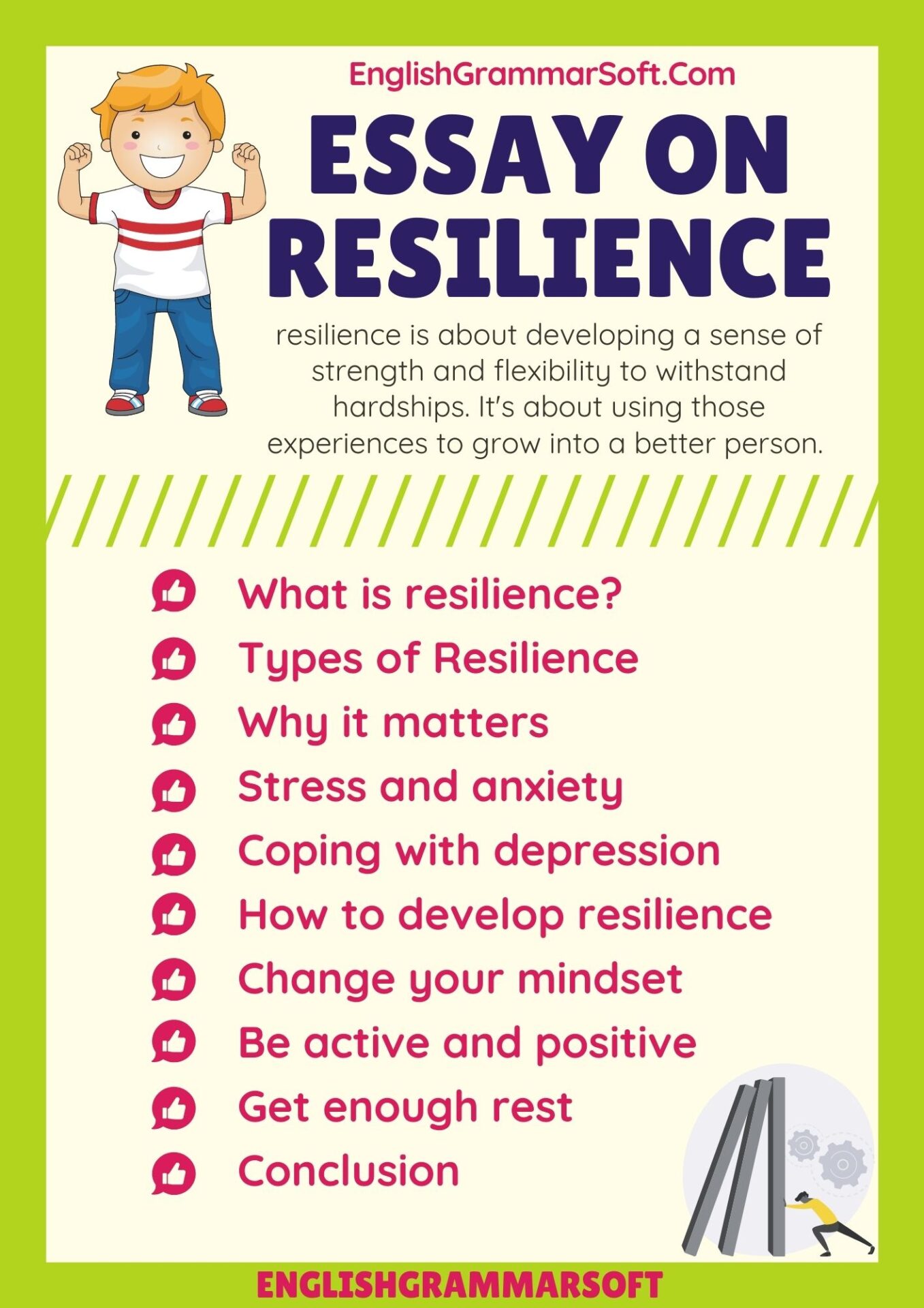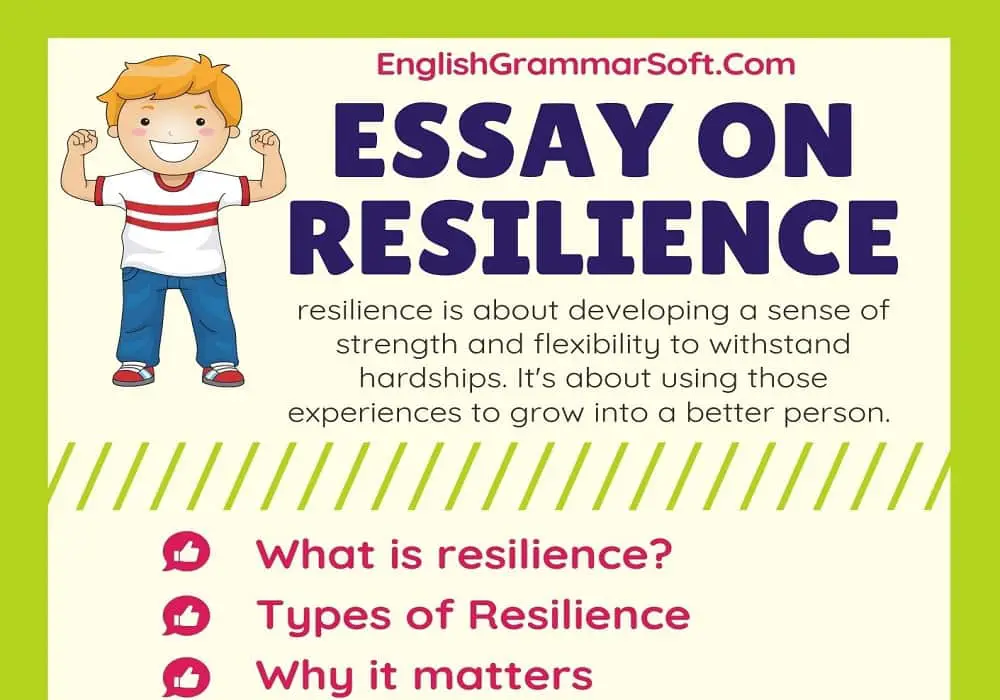Essay on Resilience: Why it important & how to develop it? (1400+ words)
The word resilience is defined as the ability to recover quickly from difficult conditions, illness, or setbacks. The meaning of this word has become more important in today’s society. We are constantly reminded of how hard it is to get through an average day, let alone a rough patch in life.
According to the National Center for Biotechnology Information (NCBI), there is a strong genetic and environmental basis for resilience. However, it’s not something we can acquire on our own. Here, are some ways we can be resilient and withstand difficulties in life with ease and grace.
Essay on Resilience
What does it mean to be resilient? The word “resilient” means “to bounce back”. This is what we’re aiming for: bouncing back from a challenge or adversity and achieving something healthy and positive as a result.
In short, resilience is about developing a sense of strength and flexibility to withstand hardships. It’s also about using those experiences to grow into a better person.
From surviving abuse to graduating college despite adversity, each struggle you’ve overcome has made you stronger and more capable of handling problems.
No matter how tough life gets, some people find a way to keep going. And that’s what resilience is all about. Resilience is the ability to come back from hard times or failure.
It’s the ability to bounce back after being knocked down. It doesn’t mean you won’t have bad days or tough moments, but it does mean you have the power to pick yourself up and carry on.
People with strong resilience are more confident, self-reliant, and secure. They don’t need outside approval for validation because they know who they are without it. Despite all the challenges in life, no one can take away your spirit. And that’s what makes you resilient.
What is resilience?
Resilience is not a matter of chance. It is a matter of choice and determination. It is your mental, emotional and physical ability to handle adversity and triumph in the midst of hard times.
This trait, which has become somewhat of a buzzword, allows you to push through struggles and difficulties in life and go on to live a happy, fulfilled life.
Resilience does not mean that you have to stay in the middle of a hurricane; it’s something you can cultivate in your life to help you live happier, healthier, longer. You need to work on building resilience every day. Without doing so, you will not be resilient. And the more you work on it, the better you will get at handling difficult situations.
Types of Resilience
There are many types of resilience. There is psychological resilience, which is the ability to overcome adversity and persevere in spite of circumstances. There is also social resilience, which is the capacity for communities to maintain their connections after an event or disaster.
Resilience can be seen in natural systems, such as trees that are able to survive under harsh weather conditions. It’s important for individuals and communities to have resilience because it can help people move on from difficult events in their lives.
But not all people are resilient enough.
Why it matters
Resilience is more important than ever because of a combination of factors. The first is that humans are evolving, which means that, as a species, we are becoming more and more resilient.
The second is that things, like work, relationships, and families, are becoming more and more challenging.
The third is that our brains aren’t equipped to handle the changing times; for instance, our ability to learn has declined.
The fourth factor that is changing and weakening our mental reserves is the rate at which we are growing.
The fifth factor that is contributing to the weakness of our brains is stress which is a physical process.
Stress and anxiety
Resilience is vital in being able to bounce back when we face life’s rough patches. If our mental and physical stressors are not dealt with, we will have difficulty maintaining a positive outlook on life.
“The emotional reaction to stress is our body’s way of protecting us.” In addition, stress and anxiety can be extremely harmful to our health and even life.
If we don’t have a good level of resiliency in our lives, our health can be affected and even in some cases, we can even die.
To help us develop resilience, we can take steps to reduce our stress and anxiety. These steps include getting more sleep, eating healthy and exercise, socializing, keeping a journal, and doing positive affirmations.
Coping with depression
Depression is an often misunderstood mental health condition. It is a harmful mental condition that we don’t talk about often.
Depression can affect us at any point in our lives and can negatively affect our lives and relationships.
But there are things we can do to develop resilience, so that we are equipped to cope with depression. There are many signs that depression is beginning to interfere with your life and people suffering from it often think that it is simply situational.
However, depression can impact your mental and physical health. With depression you may feel depressed, lethargic, have anxiety, and/or a lack of appetite or focus. You may feel like you’re going through the motions of daily life. You may have thoughts of self-harm or suicide.
How to develop resilience
First, get enough sleep. Sleep is essential for memory, thinking, stress, and most of all for our well-being.
Scientists have identified that sleeping in a timely fashion can improve memory function. Basically, getting at least 7 to 8 hours of sleep is important to prevent temporary memory lapses that impair everyday tasks, such as driving or reading directions.
Don’t procrastinate and give yourself breaks.
Stop and enjoy the simple pleasures in life, from eating to smelling flowers. Studies have found that activity, whether it’s cooking, walking, or playing with a pet, can actually lower stress levels.
Whether you find it productive to exercise or enjoy a nature walk, make sure you take a break to “recharge”.
Change your mindset
Resilience, like love, is a choice. When we begin to focus on the present rather than dwell on the past, or worry about the future, we begin to see things in a more positive light.
We begin to live in the moment and be thankful for all the good things we have in our lives. For some of us, these habits are easier said than done.
When we get caught up in worrying about what’s going to happen next, we forget to appreciate what we have.
We dwell on what might go wrong instead of taking the time to be grateful for all that’s going right in our lives.
Exploring the nature is another factor that makes you happy and resilient.
Be active and positive
Like any other word in the English language, resilience can have a myriad of meanings depending on who is saying it.
For some, it’s feeling strong and powerful, like we are in control of our lives. For others, it’s working hard to manage the things we have been dealt.
But, the truth is, as in all things, there is no one-size-fits-all definition for this word. Many people fall into one of two categories – those who say resilience is something you get from within and those who believe it’s something you can only acquire.
If you have learned how to maintain a sense of perspective and enjoy life while it happens, there’s a good chance you are going to be able to bounce back quickly if things get tough for you.
Get enough rest
The ability to cope with difficult times comes from having enough sleep. Insufficient sleep is a prime example of the challenge of being resilient.
Lack of sleep can affect your mental and physical health and increase your risk of illness, as well as developing obesity. Lack of sleep also leaves you feeling drained, which makes you less likely to be able to deal with some of the difficulties of life.
Sleep deprivation also impairs attention and concentration, which can lead to making serious mistakes, such as making critical career decisions, or even hurting others.
Conclusion
If we make it through the challenging times that life throws at us, we’ll find that we did have a great amount of resiliency.
The best way to gain resilience is by learning to bounce back from whatever life throws at us.
It takes a lot of work, determination, and discipline to go through a difficult time and get to the other side. However, it’s worth it in the end.

More on essays
- How to Write an Essay | Structure of Essay (Comprehensive Guide)
- Essay on Happiness is a State of Mind
- Essay on Education
- Essay on importance of education
- An Essay on School Life
- Essay on Friendship
- Essay about Anxiety and Stress
- Essay on Time Management
- Essay on 7 Cs of Communication
- Essay on 8 Business Functions
- Essay on Social Media and Its Impact
- Essay on Personality Development
- Essay on Leadership
- Essay on Importance of water in life
- Essay on Pollution
- Essay on Environment Protection
- Essay on Corruption
- Essay on Why Trees are Important in our Life
- 500 Words Essay on Nature in English
- Essay on Global Warming Causes and Effects
- Essay on Deforestation
- Essay on Smoking is bad for health
- A Short Essay on Mothers Day
- Essay on Health is Wealth







This was very helpful for my essay. I love the content. 😀